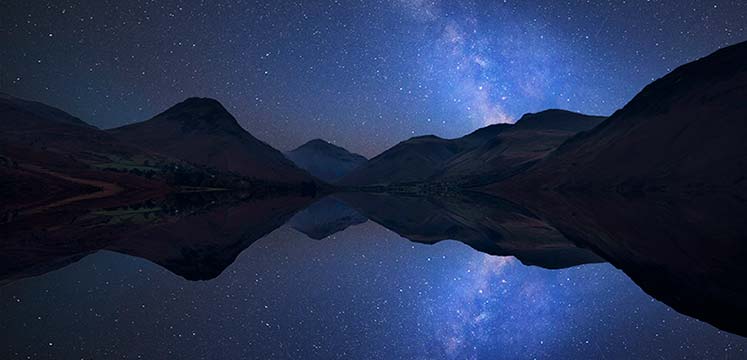
The Lake District has secluded valleys and remote fell tops, with some of the darkest skies in the country. Its the perfect place for some star gazing away from bright city lights.
Here are some of our favourite dark sky places, and some tips to make the most of your night under the stars.
A remote valley in the North West of the Lake District, Ennerdale is managed to increase wildlife and limit human intervention. There are two car parks at the Western end of the valley and a number of places you can stay. With some of the darkest skies in Cumbria, and real natural wilderness feel, Ennerdale is the perfect place for some serious star gazing.
Under the shadow of England's highest mountain, Scafell Pike, lies Wastwater, England's deepest lake. Wasdale has a rugged, remote and wild feel to it. The dramatic landscape is inspiring by day, and the dramatic dark skies are inspiring at night.
Set between Windermere and Coniston lakes, this area of forest is fairly easy to get to and has a number of car parks and cycle routes. There are a number of star gazing events at Grizedale, with talks, videos and help with telescopes, as well as star gazing outside if the skies are clear.
The peaceful Borrowdale Valley stretches south from Derwentwater, and splits into three smaller valleys, Watendlath, Stonethwaite and Seathwaite. It also includes the Honister Pass, a high, winding road which climbs out of Borrowdale and then down into the Buttermere valley. The imposing height of Scafell Pike, the highest mountain in England sits to the southern end. Climbing high away from light sources below is a great way to get really dark skies.
A fairly steep-sided valley shelters the Langdales from any town lights. Both Great Langdale and Little Langdale are great spots for dark skies, and there are some great places to eat and stay, including campsites, the ideal place to really connect with the night sky!
It can take upto 20 minutes for your eyes to truely adjust to the dark, so give yourself plenty of time to savour the night.
Using a red torch will help keep your eyes adjusted to the dark. You can make own with a cheap light painted in red nail varnish.
Even in the summer, it can get pretty cold after dark. Layers of clothing, a warm hat, and some blankets or a bean bag, will let you lie back and enjoy the skies above.
A good pair of binoculars can help you see more details at night, just the same at in the day. Although binoculars aren't as powerful as a telescope they will show 25 or even up to 50 times more than the naked eye.
There are lots of great apps for your phone that can use your location and direction to map out and name the stars and constellations above you.
Watching a stunning full-moon rise over a fell can be magical. But the extra moonlight on days around full moon does limit the stars you can see.
Light at night time is measured as luminosity. In the UK, the highest values of luminosity are measured in Glasgow, with an average of 1500 and London, with an average of 850. In the Lake District the highest level measured is 12, in central Keswick. The rest of the Park, is dark, with luminosity levels mostly measured at near 0.